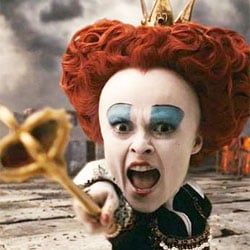Why Hollywood Only Ruins Alice In Wonderland When They Try To Remake It

In the beginning, there was Alice. The 1865 novel about a little girl's adventures in a strange fantasy land have led to countless adventure stories since, from Dorothy Gale swept up in the tornado to Coraline's encounter with the Other Mother. It's safe to say childhood in the Western world wouldn't be the same without it, and regardless of where you first learned about the Cheshire Cat and the Red Queen, they're characters as embedded in your life as people you actually know.
So in 2010, when there have been episodes of Spongebob Squarepants and Sabrina the Teenage Witch inspired by Alice's adventures, what's the point in revisiting Wonderland? There is none. Every possible take on the story, from psychedelic to psychological to gothic to hallucinogenic to kid-friendly, has been done, leaving us with a well-mined territory of familiar characters and tropes, chanting phrases like "You're late for an important date!" that barely retain their meaning. Lewis Carroll's original novel, with its twisty language and weirdly meandering plot, remains beautifully unchanged, but only by going back to the source is there anything worth finding.
Tim Burton's Alice in Wonderland, which even the director seems to have known was a creatively bankrupt idea, failed for any number of reasons, but it can't have helped that the world has run out of things to say about Alice and her friends. Even by making Alice a teenager, even by having her fight a monster at the end of the story, even by re-introducing ignored characters like the White Queen and the Knave of Hearts, Burton found Wonderland stuck back in its own repetitive rut, with the illogical Hatter and the mercurial Cheshire Cat and the mysterious, pipe-smoking Caterpillar. Try as Burton might to dazzle with the visuals, we can't help remembering that we've seen it all before--over and over again. And then again in that episode of Star Trek you'd forgotten about.

When asked how he felt about adapting the well-loved Alice material, Tim Burton brushed it off by saying, "There are interesting versions of Alice in Wonderland, but I don't feel like there's one iconic version." In a way he's right-- there is no classic Wizard of Oz-level adaptation of Alice that makes the material untouchable, which has allowed decades and decades worth of hacks to try and put their stamp on it. But even if there's no one movie or TV show or concept album that's gotten Alice right, there's one definitive version that we all remember-- the one we all imagined when we read Lewis Carroll's original book in the first place. Though everyone has a different image of what Alice looks like or even how Wonderland works, she is as potent a figure in pop culture as Dorothy Gale or Mickey Mouse. The arrogance of the movie industry is to assume, over and over again, that that phantom girl we all created for ourselves can be replaced.
Of course, if Burton's Alice in Wonderland were any good, maybe he could have pulled it off, and for the rest of time our collective memory of the Mad Hatter would be a green-eyed man with frizzy orange hair. But for all his attempts to reshape and reinvent the story, he wasn't able to get past the history into any originality, incapable of building characters out of icons like the March Hare and the Dormouse. And if Burton, with an affinity for the weird and the rambling that Carroll might have appreciated, can't pull it off, can anyone? Alice remains a touchstone of our culture, present even in places we don't expect her, but when it comes to her own story, she may be better left in the background or, best of all, in the slim, clever novel where we first found her. Why continue tampering with a perfect thing?
CINEMABLEND NEWSLETTER
Your Daily Blend of Entertainment News
Staff Writer at CinemaBlend
Most Popular







